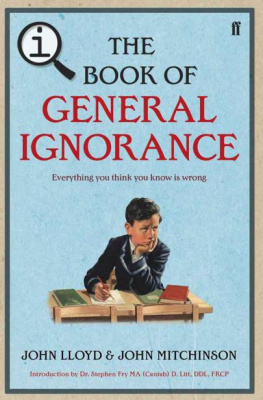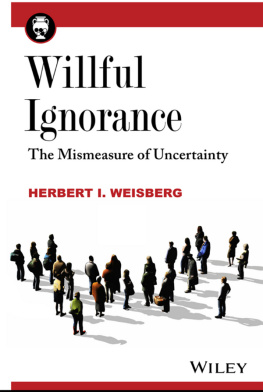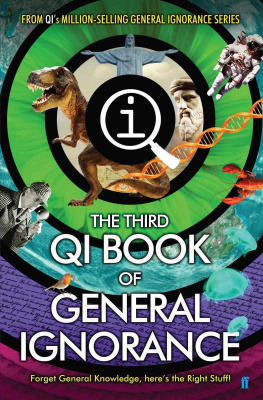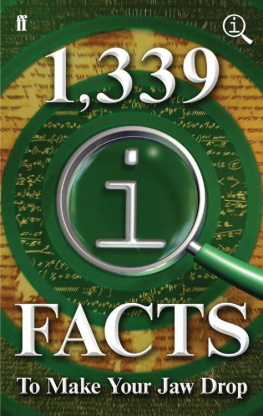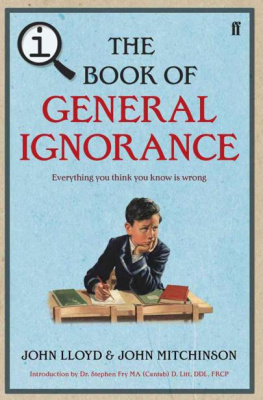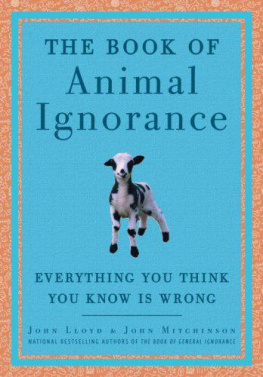A Quite Interesting Book
THE SECOND BOOK
OF
GENERAL IGNORANCE
John Lloyd and John Mitchinson
Table of Contents
FORETHOUGHT | Stephen Fry
Now, what I want is facts. Teach these boys and girls nothing but Facts. Facts alone are wanted in life. Plant nothing else, and root out everything else. You can only form the minds of reasoning animals upon Facts: nothing else will ever be of any service to them. This is the principle on which I bring up my own children, and this is the principle on which I bring up these children. Stick to Facts, sir!
Nothing but a shudder runs up the spine of the sensible man, woman or child as they read these well-known words of Thomas Gradgrind in Dickenss novel Hard Times.
But surely, Stephen, you say, in that way of yours, QI and General Ignorance and all that they are or hope to be represent nothing more than the triumphant distillation of Gradgrindery, fact-dweebiness, trivia-hoarding and information-hugging. The world of noble ideas falls before your world of grinding facts. Facts are the abrasive touchstones on which we test the validity of concepts! Surely, Stephen. Surely, surely, surely! Im right, arent I? Arent I? Oh do say I am!
Well now, bless you and shush and oh you dear things. Calm yourselves and sit down in a semicircle on the play mat while we think about this.
I know it must seem sometimes that QI is a nerds charter that encourages boring dorks to vomit undigested boluses of fibrous factoid. QI and its volumes of General Ignorance might appear to some to be nothing more than provisioners of ammunition for tiresome gainsaying did-you-knowers and tedious trotters out of turgid trivia. But look beneath the surface and I hope you will agree that the volume that you hold in your delicate hands is in truth a celebration , a celebration of the greatest human quality there is. Curiosity. Curiosity has wrongly, by those with a vested interest in ignorance and their own revealed truths, been traduced and eternally characterised as a dangerous felicide, but you, dearest of dear, dear readers, know that Curiosity lights the way to glory.
Let us put it another way: the lack of curiosity is the Dementor that sucks all hope, joy, possibility and beauty out of the world. The dull torpid acedia that does not care to find out, that has no hunger and thirst for input, understanding and connection will desertify the human landscape and land our descendants squarely in the soup.
Do we want our species to make its way, foreheads thrust out, knuckles grazing the ground, into a barren of tedium and brutish unquestioning blindness, or do we want to skip through the world filled with wonder, curiosity and an appetite for discovery?
This screamingly overwrought preface that is even now embarrassing you to the encrimsoning roots of your scalp, is called Forethought in honour of Prometheus, the greatest of the Titans of Greek mythology. Prometheus, whose brother Atlas was busy holding up the world, looked at us poor newly made humans and loved us and felt sorry that we were animals so close to gods yet still lacking something
Prometheus climbed up Olympus and stole that something from the gods, bringing it down carefully preserved in a fennel stalk. It was fire. Fire that gave us technology, but more than that, it was iskra, the spark, the divine fire, the quality that drove us to know . The fire that allowed us to rise up on a level with the gods.
The Greeks rightly understood that if there were such creatures as gods, they were (it is self-evident) capricious, inconsistent, unjust, jealous and mean. And indeed Zeus, their king, was outraged that Prometheus, one of their own, had given humans great creating fire. He punished the Titan by chaining him to the Caucasus mountains. Every day an eagle (or vultures depending on your source) came to peck out his liver, which (Prometheus being an immortal) grew back each night. This eternal torture he underwent for humans, that we might, each one of us, have the divine spark, the immortal fire that drives us to ask Why? Who? When? What? Where? and How?
The name Prometheus means Forethought. We can repay him his daily agony by being, every day, curious, wondering and entirely on fire.
I adore you widely.
SECOND THOUGHTS | John Lloyd and John Mitchinson
When we compiled the original Book of General Ignorance in 2006 aided by the doughty and indefatigable QI Elves we laboured under the misconception that we might have mined the Mountain of Ignorance to exhaustion, depleting its resources forever.
Nothing could be further from the truth.
Four years on, four series later, there is so much more ignorance available that weve had to deliberately cull it in order to make this Second Book of General Ignorance tolerably portable.
We hope youll have as much fun reading it as weve had putting it together.
It is a wonderful thing that we, The Two Johnnies (aged 58 and 47 respectively) can honestly say that we genuinely do learn something new every day.
Thank you for allowing us to do that.
THE SECOND BOOK
OF
GENERAL IGNORANCE
Everybody is ignorant, only on different subjects.
Will Rogers (18791935)
Who made the first flight in an aeroplane?
We dont know his name but he beat the Wright Brothers to it by fifty years.
He worked for Sir George Cayley (17731857), an aristocratic Yorkshireman and pioneer of aeronautics, who carried out the first truly scientific study of how birds fly. Cayley correctly described the principles of lift, drag and thrust that govern flight and this led him to build a series of prototype flying machines. His early attempts with flapping wings (powered by steam and gunpowder engines) failed, so he turned his attention to gliders instead.
In 1804 he demonstrated the worlds first model glider and, five years later, tested a full-sized version but without a pilot. More than three decades passed before he finally felt ready to trust his governable parachute with a human passenger. In 1853, at Brompton Dale near Scarborough, the intrepid baronet persuaded his reluctant coachman to steer the contraption across the valley. It was this anonymous employee who became the first human ever to fly in a heavier-than-air machine.
The coachman, so the story goes, was not impressed. He handed in his notice as soon as he landed, saying, I was hired to drive, not to fly. A modern replica of Cayleys glider, now on show at the Yorkshire Air Museum, successfully repeated the flight across Brompton Dale in 1974.
But wings werent Sir Georges only legacy. With his work on the gliders landing gear, he literally reinvented the wheel. Needing something light but strong to absorb the aircrafts impact on landing, he came up with the idea of using wheels whose spokes were held at tension, rather than being carved from solid wood. These went on to transform the development of the bicycle and the car and are still widely used today.
And that wasnt all. Cayley was a remarkably prolific inventor, developing self-righting lifeboats, caterpillar tracks for bulldozers, automatic signals for railway crossings and seat belts. Even more remarkably, he offered all these inventions for the public good, without expecting any financial reward.
The Wright Brothers made their famous flights half a century later, in 1903. They were inspired by Cayley and by another unsung hero of aviation, Otto Lilienthal (184896), a Prussian known as the Glider King. He was the first person to fly consistently: in the decade before the Wright Brothers, he made over 2,000 glider flights before falling to his death in 1896. His last words were humble and poignant: Small sacrifices must be made.
Next page



